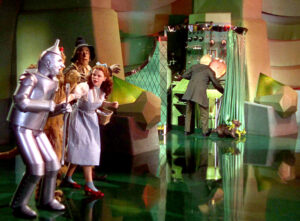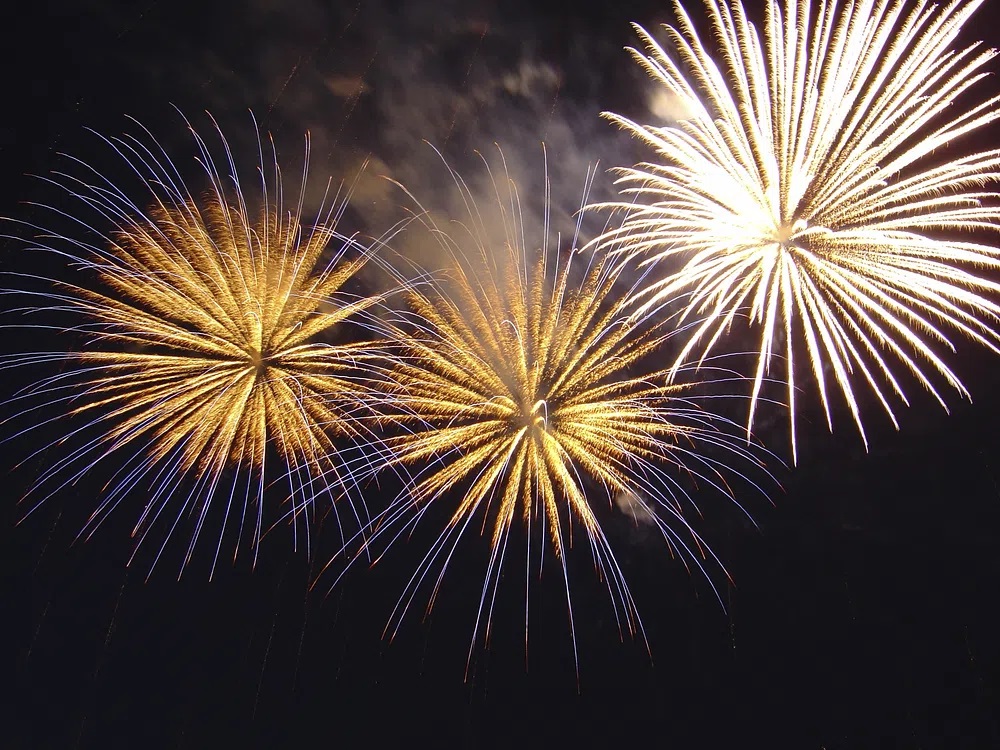I remember the day my relationship with fireworks changed. I don’t know what changed, or why I had never seen it before, but I remember suddenly noticing that I could see the shells climbing up into the air, trailing sparks, reaching apogee, and bursting. A few bursts later, I realized I could also see the flash and hear the thump when the mortars first fired, and even see the men running around lighting the fuses.

In that moment, a bit of the magic suddenly died. I mean, I was still awed by the resounding THUD of each burst, and amazed by the glorious colors and sparkles and feathery trails of light. But suddenly it wasn’t just pure magic, those bursts appearing abruptly from nothingness, then disappearing; now I realized that they all had a very earthly origin.

A few years later, I was at a baseball game that had fireworks afterwards, and the wind was blowing towards the crowd. As I sat there watching, bits of the burnt paper and cardboard shells started falling around us. And another bit of magic died in that moment. Suddenly not only did they have an earthly origin, they also had a very pedestrian composition- and left behind a lot of trash.
Now, some years later and more mature, I find fireworks fascinating from an intellectual standpoint, how they are constructed and how the different colors are chemically produced, how the different burst patterns are carefully manufactured into the shells, how they are safely and reliably launched, how the shows are coordinated, and more. And I still enjoy the chest-pounding sensation of the large shells exploding, and the pure aesthetics of the colors and patterns.
But it’s not magical. Not any longer.
I got to thinking about this as we saw some fireworks this July 4th. And I realized that the process of maturing with regard to fireworks bears a striking resemblance to my ongoing relationship with God and religion.
When I was younger, new to the faith, everything was magical. I suppose that’s a forbidden word to use for Christianity, but I think it’s applicable in the technical meaning of the word. All the hidden knowledge was invisible to me, and there was a lot of “just because” in the matter. “Faith” was required, because none of it was explainable. I don’t mean the Bible miracles; I am referring to the Sunday morning ritual, the emotional responses in me, the dogma and the doctrine in which I’d placed my trust.

And then, suddenly one day, I realized I could see the men lighting the fuses, I could see the shells lofting before they burst. I could see the burnt debris falling from the very non-magical, very tangible, manmade bits of cardboard and black powder. Or, insofar as this is really about religion, I could see the men pulling the doctrinal strings, like the Wizard of Oz behind the curtain. I could see the causality of human involvement in all aspects of the production and services. I could see the ways that our worship practices shaped – or directly drove – the emotional responses of the audience, in ways that suddenly did not look quite so natural as I had always imagined. And worst of all, I could see some ugly debris fallout from the pretty shiny flashy things, as it wasn’t as clean and pure light as it had appeared to me for years; some things caused harm when I knew what to look for.
Suddenly, watching fireworks – or attending church services – was full of distractions. All those things to see, all those no-longer-hidden human actors behind what had previously appeared as purely spiritual or magical, all the side effects and undesirable consequences – I couldn’t ignore them.
But at the same time, there is still a reality in the beauty of those bursts of light in the air. That reality cannot be denied. Man has an undeniable hand in it, but it’s still full of beauty and power… if I can wrest my mind and my eyes away from the man behind the curtain, the men lighting the fuses. I can appreciate the all of the artwork and the physics and the mechanics simultaneously, even while knowing that it’s not what I used to think.
To use a different analogy, I’ve been given a bite from the Tree of Knowledge, and my eyes have been opened. I can never go back to that innocent – and ignorant – ability to just enjoy the magic and believe it’s everything there is to know. My faith will never be so simple again.
And it’s a combination of exhilarating and deeply frustrating. At some real level, I’d prefer never to have crossed that line, to have eaten that fruit, to know these things. But I also think I’m better off knowing what I now know. When things seem magical, they are uncontrollable, uncontainable. We’re left feeling subject to forces far beyond ourselves – I’m not talking about God, I’m talking about the men pulling the strings. Even the hints I saw of human involvement looked magical, godly. But when we really know the people and the technologies at play, we are also able to shape and corral and apply boundaries to those forces, and help others avoid the mess, the debris, the fallout.
And that inherently now makes us accountable. Unfortunately or fortunately, we are no longer able to sit and enjoy the show with nary a care. To paraphrase Peter Parker’s Uncle Ben, “with great knowledge comes great responsibility.” Or as Jesus cautioned us in Luke 12:48, “From everyone who has been given much, much will be demanded; and from the one who has been entrusted with much, much more will be asked.”
So just like that day when the fireworks lost their magic for me, yet became richer and more complex, my faith became richer and more complex – but not without a cost.
And I accept that cost. I’ve long been aware that the eternal destiny of the Body of Christ is to rule and reign on the new earth someday. And I’m also increasingly aware that most of the harsh things that Jesus and the prophets had to say were directed squarely at leaders and rulers. If that destiny is what God has in mind for me, for us, then a true clarity of vision, seeing “behind the curtain” to understand the truth from a higher, more mature perspective, is going to be essential to faithfully representing my King to those He is calling me to serve.
So while I will always be nostalgic about those early days of simple, easy, magical fireworks and faith, I don’t regret the maturity. It’s all part of giving God my “yes,” being willing to move forward with Him.

